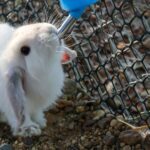Rabbits are herbivorous animals that require a balanced and nutritious diet to maintain good health. One of the most important factors in providing a healthy diet for rabbits is using the right feeder. A good feeder not only helps to prevent food waste but also ensures that the rabbit’s food is kept clean and free from contamination. In this article, we will be discussing 10 high-quality feeders worth buying for rabbits.
One of the most important factors to consider when selecting a feeder for rabbits is the material it is made from. High-quality feeders are usually made from non-toxic materials that are durable and easy to clean. Another important factor to consider is the design of the feeder. A good feeder should be easy to access and use, and it should also be able to hold enough food for your rabbit.
The 10 high-quality feeders we will be discussing in this article have been carefully selected based on their quality, durability, ease of use, and affordability. Whether you are looking for a simple feeder or a more complex one with additional features, you will find something suitable on our list. With the right feeder, you can provide your rabbit with a healthy and nutritious diet that will help them thrive.
Types of Rabbit Feeders
Gravity Feeders
These are usually plastic or metal feeders that hold loose pellets or other dry food. They work by gravity, releasing small amounts of food into a dish or tray as the rabbit eats. They are easy to use and can hold a large amount of food, but they can be prone to clogging and can attract rodents.
Hay Feeders
These feeders are designed to hold hay, which is an essential part of a rabbit’s diet. They can be made of metal or plastic and come in various shapes and sizes, from simple baskets to more complex designs that attach to the side of a cage. They help keep hay clean and reduce waste, but can sometimes be difficult to refill.
Water Bottles
These are plastic bottles that attach to the side of a cage and dispense water through a metal or plastic tube. They are a convenient way to provide fresh water to rabbits, but they can be prone to leaking and can freeze in cold weather.
Food Bowls
These are typically ceramic or plastic dishes that hold pellets or other dry food. They are simple and easy to use, but can be easily tipped over and may not hold as much food as other types of feeders.
Factors to Consider When Choosing Rabbit Feeders:
- Size and Capacity: The feeder should be appropriate for the size of your rabbit(s) and should hold enough food or water for several days.
- Durability: The feeder should be sturdy enough to withstand daily use and should be made of non-toxic materials that won’t harm your rabbit(s)
- Ease of Cleaning: The feeder should be easy to take apart and clean, as this helps prevent the buildup of bacteria and other harmful substances.
- Safety: The feeder should be safe for your rabbit(s) to use and should not have any sharp edges or parts that could harm them.
- Cost: The feeder should be reasonably priced and fit within your budget, but also meet your needs in terms of size, capacity, durability, and safety.
Here are 10 High-Quality Rabbit Feeders
- Ware Manufacturing Hay Feeder: This feeder is made of durable powder-coated wire and is designed to attach easily to most cages. It has a lid that can be easily opened for refilling.
- Kaytee Hay & Food Bin Feeder: This feeder is made of plastic and can be attached to any wire cage. It has a large capacity and can hold both hay and pellets.
- Living World Lock and Crock Dish: This dish is made of durable plastic and can be attached to wire cages. It is great for holding pellets or other dry food.
- Lixit Rabbit Feeder/Water Fountain: This feeder is a two-in-one product that can hold both food and water. It is made of durable plastic and is easy to clean.
- Harris Farms Plastic Feed Scoop: This scoop is made of heavy-duty plastic and is great for measuring out food portions. It has a flat bottom that allows it to sit upright when not in use.
- Small Pet Select Hay Feeders: These feeders are made of high-quality stainless steel and are designed to attach to most cages. They are rust-resistant and easy to clean.
- Ware Manufacturing Plastic Corner Feeder: This feeder is designed to fit snugly in the corner of a cage and is made of durable plastic. It is easy to clean and can hold a large amount of food.
- Ware Manufacturing Plastic Food Scoop: This scoop is made of durable plastic and is great for measuring out food portions. It has a flat bottom that allows it to sit upright when not in use.
- Kaytee Chew-Proof Water Bottle: This water bottle is made of high-quality glass and has a chew-proof metal cap. It is easy to refill and is designed to prevent leaks.
- Lixit Chew-Proof Glass Water Bottle: This water bottle is made of high-quality glass and has a chew-proof metal cap. It is easy to refill and is designed to prevent leaks.
Advantages of high-quality feeders for rabbits
- Increased efficiency: High-quality feeders can help to reduce feed wastage and ensure that rabbits receive the appropriate amount of food.
- Improved hygiene: Good-quality feeders can be easily cleaned and sanitized, which can help to reduce the risk of disease and contamination.
- Reduced labor: Automated feeders can be programmed to dispense feed at regular intervals, which can help to reduce the amount of labor required to care for rabbits.
- Better feed quality: Some high-quality feeders are designed to preserve the quality of the feed and prevent it from spoiling or becoming contaminated.
- Customizable: Some high-quality feeders can be adjusted to dispense different types of feed, such as pellets, hay, or fresh greens.
Disadvantages of high-quality feeders for rabbits
- Cost: High-quality feeders can be more expensive than basic feeders or manual feeding methods, which may be a barrier for some rabbit owners.
- Maintenance: Automated feeders require regular maintenance, including cleaning and replacing parts, which can be time-consuming and costly.
- Dependence on technology: Automated feeders rely on technology, which means they may malfunction or stop working if there is a power outage or other technical issue.
- Limited control: Some high-quality feeders may be difficult to adjust or customize, which can limit the ability to provide specific feed amounts or types to rabbits.
- Learning curve: Some high-quality feeders may require a learning curve for both rabbits and their owners, which may be a challenge for some individuals.
Effectiveness of High-Quality Feeders
High-quality feeders can be an effective tool for feeding rabbits, especially in larger commercial operations. The effectiveness of these feeders depends on a number of factors, including the type of feeder used, the design of the feeder, and the specific needs of the rabbits being fed.
Automated feeders, for example, can be very effective in reducing labor and feed wastage, while ensuring that rabbits receive the appropriate amount of feed at regular intervals. These feeders can be programmed to dispense feed at specific times of the day or in specific quantities, which can help to maintain consistent feed intake and promote healthy growth.
Good-quality feeders can also be effective in reducing the risk of disease and contamination, as they are designed to be easily cleaned and sanitized. This can help to prevent the spread of pathogens and keep rabbits healthy.
However, the effectiveness of high-quality feeders may also depend on the specific needs of the rabbits being fed. For example, rabbits with specific health concerns or dietary requirements may require more specialized feeding methods or customized diets, which may not be possible with certain types of feeders.
Key Takeaways
- Choosing the right feeder for your rabbit is an important aspect of their overall health and well-being.
- The 10 high-quality feeders discussed in this article offer a variety of options to suit different rabbit breeds, dietary needs, and personal preferences.
- From gravity feeders to automatic feeders, and from hay feeders to combination feeders, there is a feeder to suit every rabbit’s needs.
- It is important to consider factors such as material, size, accessibility, design, durability, cost, cleaning, and safety when choosing a feeder for your rabbit.
- By investing in a quality feeder, you can ensure that your rabbit receives a healthy and nutritious diet and prevent food waste and contamination.


